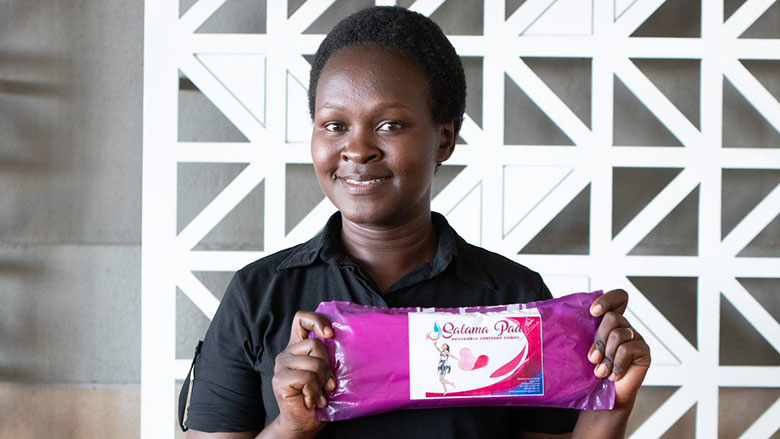DAR ES SALAAM, December 12, 2018 – Growing up in Western Kenya, Lucy Odiwa did not know much about menstruation. When it finally happened to her during class at age 16, she was shocked.
The experience of being scared, embarrassed, and not knowing what to do, inspired her to start a business to empower women and girls in Tanzania.
In 2016, with just Sh200,000 ($75), she started WomenChoice Industries, a micro-enterprise that promotes menstrual health hygiene management (MHM) by sharing information, products and related services. With two, second-hand sewing machines and the help of two tailors, she started producing reusable menstrual pads named, Salama—Swahili, for “safe”—so that girls could have them ready for their first period.
“Girls face embarrassment during menstruation and most will have their first period while at school, which can be very frustrating,” Odiwa said. “Many miss school during this time and they simply can’t compete with boys who attend school regularly. So, I would explain to them what menstruation is about, and why they need to ask for help when it happens.”
WomenChoice Industries recently won the first SDGs and Her Competition, which recognizes women micro-entrepreneurs helping to achieve the Sustainable Development Goals. In addition to producing reusable sanitary napkins, the company creates post-partum maternity pads, child and adult diapers, and promotes MHM in schools to promote quality education for all.
For Sh5,000 ($2), Salama pads contain five pads per pack and are reusable for up to three years. The target market is women from poor households in rural Tanzania who can’t afford disposable sanitary towels every month.
“Menstruation is very costly, and it is a cost that has not been brought to light,” said Odiwa. “Reusable pads are a healthy solution to those who can’t afford to buy disposable pads.”
WomenChoice representatives also travel across the country, and to communities and schools in and near Tanga, where they talk to women, girls and boys, targeting taboos against menstruation.
Godfrey Bonaventura, Head of Programmes at HakiElimu, a non-profit organization that advocates for inclusive quality education, is in full support of Odiwa’s work.
Menstruation and access to sanitary pads are challenges that significantly hinder the girl child’s access to continued quality education. Girls who do not have access to pads miss three to four classes each month during their menses, which adds up to 30 to 40 missed days per school year.
“This is a big challenge which affects these children,” said Bonaventura. “You cannot blame them when they fail to solve mathematics problems for example, because they missed lessons. Blame it on poverty which is the source of their lack of sanitary pads.”
In September, during the United Nations General Assembly High-Level Week in New York, Odiwa was honored as the inaugural winner of SDG and Her, chosen out of more than 1,200 entries from 88 countries. The contest was co-sponsored by the World Bank Group, the Wharton School Zicklin Center, United Nations Development Programme, and UN Women.
“This victory means that our initiative is appreciated by society,” said Odiwa, who has expanded the business to employ five tailors and a supervisor, and produce reusable child and adult diapers, breast pads and post-partum maternity pads. “This trophy gives women and girls in Tanzania the opportunity to continue to be served.”



